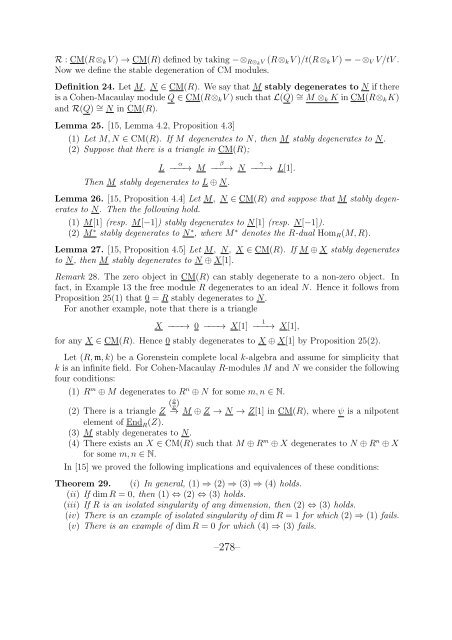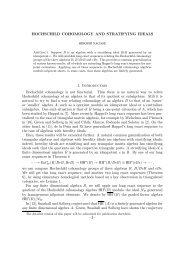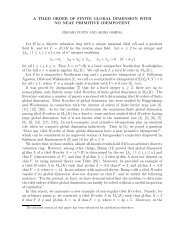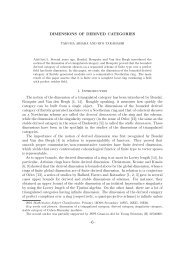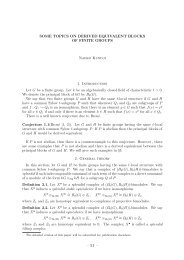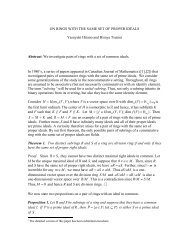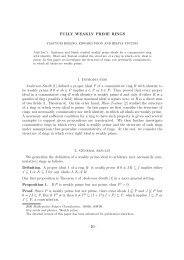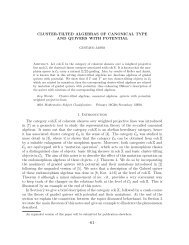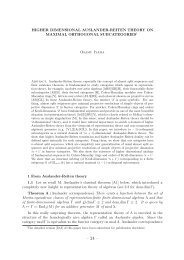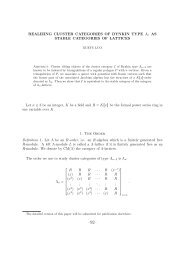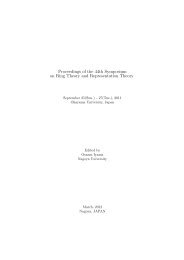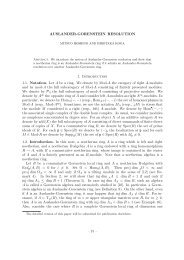Proceedings of the 44th Symposium on Ring Theory and ...
Proceedings of the 44th Symposium on Ring Theory and ...
Proceedings of the 44th Symposium on Ring Theory and ...
You also want an ePaper? Increase the reach of your titles
YUMPU automatically turns print PDFs into web optimized ePapers that Google loves.
R : CM(R⊗ k V ) → CM(R) defined by taking −⊗ R⊗k V (R⊗ k V )/t(R⊗ k V ) = −⊗ V V/tV .<br />
Now we define <str<strong>on</strong>g>the</str<strong>on</strong>g> stable degenerati<strong>on</strong> <str<strong>on</strong>g>of</str<strong>on</strong>g> CM modules.<br />
Definiti<strong>on</strong> 24. Let M, N ∈ CM(R). We say that M stably degenerates to N if <str<strong>on</strong>g>the</str<strong>on</strong>g>re<br />
is a Cohen-Macaulay module Q ∈ CM(R⊗ k V ) such that L(Q) ∼ = M ⊗ k K in CM(R⊗ k K)<br />
<strong>and</strong> R(Q) ∼ = N in CM(R).<br />
Lemma 25. [15, Lemma 4.2, Propositi<strong>on</strong> 4.3]<br />
(1) Let M, N ∈ CM(R). If M degenerates to N, <str<strong>on</strong>g>the</str<strong>on</strong>g>n M stably degenerates to N.<br />
(2) Suppose that <str<strong>on</strong>g>the</str<strong>on</strong>g>re is a triangle in CM(R);<br />
L<br />
α<br />
−−−→ M<br />
β<br />
−−−→ N<br />
Then M stably degenerates to L ⊕ N.<br />
γ<br />
−−−→ L[1].<br />
Lemma 26. [15, Propositi<strong>on</strong> 4.4] Let M, N ∈ CM(R) <strong>and</strong> suppose that M stably degenerates<br />
to N. Then <str<strong>on</strong>g>the</str<strong>on</strong>g> following hold.<br />
(1) M[1] (resp. M[−1]) stably degenerates to N[1] (resp. N[−1]).<br />
(2) M ∗ stably degenerates to N ∗ , where M ∗ denotes <str<strong>on</strong>g>the</str<strong>on</strong>g> R-dual Hom R (M, R).<br />
Lemma 27. [15, Propositi<strong>on</strong> 4.5] Let M, N, X ∈ CM(R). If M ⊕ X stably degenerates<br />
to N, <str<strong>on</strong>g>the</str<strong>on</strong>g>n M stably degenerates to N ⊕ X[1].<br />
Remark 28. The zero object in CM(R) can stably degenerate to a n<strong>on</strong>-zero object. In<br />
fact, in Example 13 <str<strong>on</strong>g>the</str<strong>on</strong>g> free module R degenerates to an ideal N. Hence it follows from<br />
Propositi<strong>on</strong> 25(1) that 0 = R stably degenerates to N.<br />
For ano<str<strong>on</strong>g>the</str<strong>on</strong>g>r example, note that <str<strong>on</strong>g>the</str<strong>on</strong>g>re is a triangle<br />
X −−−→ 0 −−−→ X[1]<br />
1<br />
−−−→ X[1],<br />
for any X ∈ CM(R). Hence 0 stably degenerates to X ⊕ X[1] by Propositi<strong>on</strong> 25(2).<br />
Let (R, m, k) be a Gorenstein complete local k-algebra <strong>and</strong> assume for simplicity that<br />
k is an infinite field. For Cohen-Macaulay R-modules M <strong>and</strong> N we c<strong>on</strong>sider <str<strong>on</strong>g>the</str<strong>on</strong>g> following<br />
four c<strong>on</strong>diti<strong>on</strong>s:<br />
(1) R m ⊕ M degenerates to R n ⊕ N for some m, n ∈ N.<br />
(2) There is a triangle Z (φ ψ)<br />
→ M ⊕ Z → N → Z[1] in CM(R), where ψ is a nilpotent<br />
element <str<strong>on</strong>g>of</str<strong>on</strong>g> End R (Z).<br />
(3) M stably degenerates to N.<br />
(4) There exists an X ∈ CM(R) such that M ⊕ R m ⊕ X degenerates to N ⊕ R n ⊕ X<br />
for some m, n ∈ N.<br />
In [15] we proved <str<strong>on</strong>g>the</str<strong>on</strong>g> following implicati<strong>on</strong>s <strong>and</strong> equivalences <str<strong>on</strong>g>of</str<strong>on</strong>g> <str<strong>on</strong>g>the</str<strong>on</strong>g>se c<strong>on</strong>diti<strong>on</strong>s:<br />
Theorem 29. (i) In general, (1) ⇒ (2) ⇒ (3) ⇒ (4) holds.<br />
(ii) If dim R = 0, <str<strong>on</strong>g>the</str<strong>on</strong>g>n (1) ⇔ (2) ⇔ (3) holds.<br />
(iii) If R is an isolated singularity <str<strong>on</strong>g>of</str<strong>on</strong>g> any dimensi<strong>on</strong>, <str<strong>on</strong>g>the</str<strong>on</strong>g>n (2) ⇔ (3) holds.<br />
(iv) There is an example <str<strong>on</strong>g>of</str<strong>on</strong>g> isolated singularity <str<strong>on</strong>g>of</str<strong>on</strong>g> dim R = 1 for which (2) ⇒ (1) fails.<br />
(v) There is an example <str<strong>on</strong>g>of</str<strong>on</strong>g> dim R = 0 for which (4) ⇒ (3) fails.<br />
–278–


